This Unit 2 vocabulary word is another word for FARMING.
Agriculture
Paleolithic or Neolithic:
"old Stone Age"
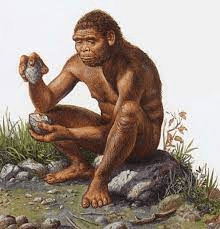
Paleolithic
STUDY GUIDE QUESTION #5
- Record under 1st bullet point
- What is the Neolithic then?
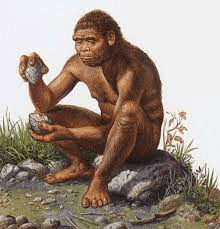
This POSITIVE (+) result of the Neolithic Revolution meant communities had extra food that they could save and store for later, especially during hard times.
Food surplus
STUDY GUIDE QUESTION #8
- Record the definition
This NEGATIVE (-) result of the Neolithic Revolution meant that people would that more people would get sick and potentially die. The Hadza people do not experience these wide-spread.
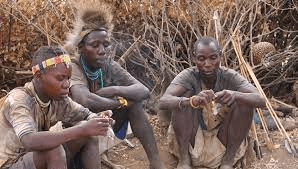
Disease
Human beings first came from this continent surrounded by the Atlantic and Indian Oceans.
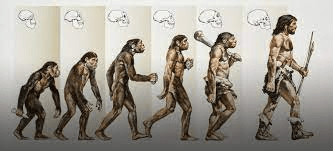
Africa
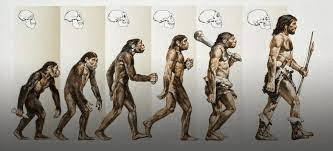
This Unit 2 vocabulary word means "a person who moves from place to place, instead of living in one place."
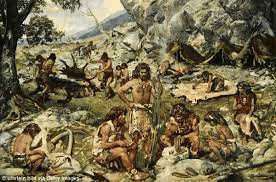
Nomad = a person who moves from place to place, instead of living in one place.
STUDY GUIDE QUESTION #1
- Record the definition
- Are we nomadic?
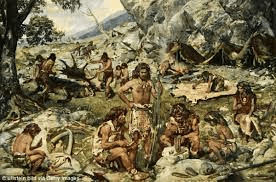
Paleolithic or Neolithic:
Invented farming
Neolithic
STUDY GUIDE QUESTION #5
- Record under 2nd bullet point
- How did Paleolithic people find food?
This POSITIVE (+) result of the Neolithic Revolution meant that people could have different jobs -- not everyone had to be a farmer. People could make art, build homes, and more!
Division of labor
STUDY GUIDE QUESTION #6
- Record the definition
- What is an example of this?
This NEGATIVE (-) result of the Neolithic Revolution meant that groups would experience more conflict over land and power. Armies were created during this time to help those in power fight these.
War / warfare
The first humans left Africa in search of food when the __________ changed.
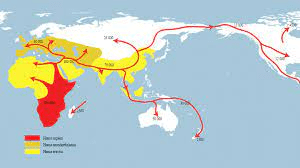
Climate
STUDY GUIDE QUESTION #3
- Let's record this information!
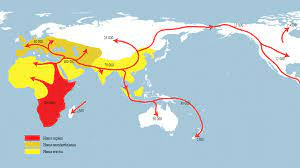
This Unit 2 vocabulary word means "a person who hunts animals and looks for plants to eat, instead of farming."
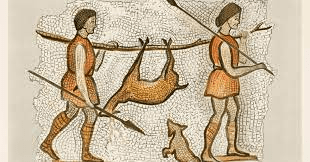
Hunter-gatherer = a person who hunts animals and looks for plants to eat, instead of farming.
STUDY GUIDE QUESTIONS #2
- Record the definition
- Why do hunter-gatherers need to be nomadic?
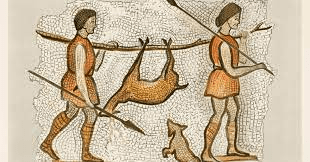
Paleolithic or Neolithic:
Formed permanent settlements or communities
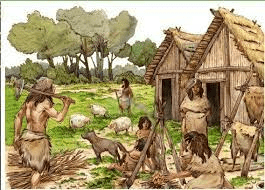
Neolithic
STUDY GUIDE QUESTION #5
- Record under bullet #3
- How did Paleolithic people live?
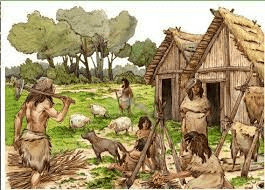
This POSITIVE (+) result of the Neolithic Revolution meant that people could live in one place more safely and comfortably than ever before. These eventually turned into villages, which turned into cities.
Permanent settlements / homes
This NEGATIVE (-) result of the Neolithic Revolution meant that some groups had more power than others. Groups were often unequal. Fill in this blank: _________ stratification
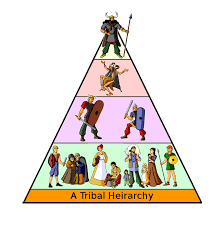
Social stratification = groups of people separated by different categories; often creates inequality.
STUDY GUIDE QUESTION #9
- Record the definition
- How is this connected to farming?
Paleolithic art was once made from (3) types of materials. What 3 materials?
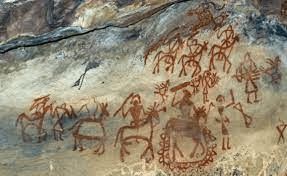
Water, dirt, and blood
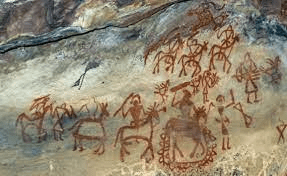
This Unit 2 vocabulary word means "to make plants or animals useful to humans."
Domesticate / Domesticated = to make plants or animals useful to humans.
STUDY GUIDE QUESTION #7
- Record the definition
- Give (2) examples and (2) non-examples
Paleolithic or Neolithic:
Lived 2.6 million to 12,000 years ago
Paleolithic
STUDY GUIDE QUESTION #5
- Record under bullet #4
- How long ago did Neolithic people live?
True (T) or False (F):
Food surplus meant bigger families and increased population.
TRUE!
STUDY GUIDE QUESTION #8
- Results of food surplus are bigger families and increased population.
TRUE (T) or FALSE (F):
In Neolithic times, women often had a LOT more power than other groups in society.
FALSE:
Women often experienced inequality and a lack of power.
TRUE (T) or FALSE (F):
The first humans migrated (or moved from one place to another) from Africa by taking only ONE route or path.False!
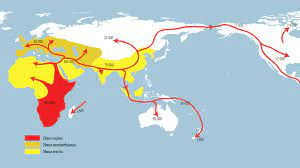
This Unit 2 vocabulary word means "the new Stone Age. People lived in one place and learned to farm."
Neolithic Revolution = the new Stone Age. People lived in one place and learned to farm.
STUDY GUIDE QUESTION #4
- Record the definitions
- Why is this called the Agriculture Revolution?
Paleolithic or Neolithic:
Humans in these times discovered fire using stone and wood.

Paleolithic
